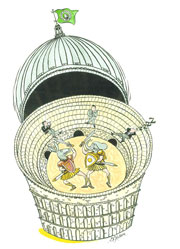THE DEMOCRATS WANT Congress back and they want it bad. The House, it would seem, with its slim six-seat Republican margin, might be ripest for the taking.
One place that’s got them licking their chops is Washington’s 2nd District, the rangy, fast-growing stretch of metastasizing suburbs, heavy industry, and raspberry farms that sprawls from the Canadian border to Mukilteo. It opened up after courtly Republican Jack Metcalf term-limited himself after six years in office.
Considered a bellwether, the district is a high priority for both parties. It ranks number two in CNN political analyst Stu Rothenberg’s “Dangerous Dozen” list of important open seats.
Republicans got a real break in April when moderate former legislator Barry Sehlin dropped out, cinching the nomination for outspoken Sultan conservative Representative John Koster, 48. Despite the buttressing of his campaign by a visit from his old friend Senator John McCain and support by Republican mods such as Secretary of State Ralph Munro, Sehlin claims he ran out of money. He won’t deny, however, pressure exerted by state and national GOP leaders for him to get out of Koster’s way to avoid an expensive and bruising primary battle.
Democrats already had a clear primary for Snohomish County Councilman Rick Larsen, 35, after Sedro Wooley Representative Jeff Morris quit the race in September, blaming his “lack of labor support.” Personal calls from US House Minority Leader Richard Gephardt reportedly were also a factor.
Money is the mother’s milk of politics, and both candidates have definitely “got milk.” Mammaries are made of this—big national party bucks are immediately available to each now that neither has primary opposition.
“Washington is in the crosshairs,” says Dave Hanson, political director of the Republican Senatorial Campaign Committee. “You will see,” he says, “a barrage of outside money that will be exceptional.” Gene Goldsmith, Whatcom County GOP chair, says, “There’ll be over $3 million spent between the two on this campaign.”
Larsen leads with $572,000 raised with $444,000 left on hand, but Sehlin’s exit has boosted Koster’s lagging fundraising. He ended the first quarter of this year with total receipts of $142,000 and $25,000 cash on hand, according to campaign manager Larry Stickney.
Koster’s team snapped into action within hours of Sehlin’s withdrawal, talking to officials at the National Republican Congressional Committee and securing promises to receive the party’s full financial support in the race to keep the northwestern Washington district in Republican hands.
Koster received an endorsement from House Majority Whip Tom DeLay of Texas at a press conference in Everett last month. “The state of Washington is fertile ground for us,” DeLay said, “and this is one of three races we feel we can win.” With that, DeLay handed Koster a check for $10,000 and promises of more. He said Larsen has benefited from having no opponent in the September primary, but added, “We expect to gain ground on him very quickly.”
Democrats are bringing out the national guns and more money too. The head of the Democratic Congressional Campaign Committee, Rhode Island Representative Patrick Kennedy, son of Senator Ted Kennedy, came to fundraise in the district last month. “Rick Larsen,” he said, “is among our very top choices of candidates we expect to elect if we hope to win back the House.”
THE CONGRESSIONAL SEAT was held by Democrats for 30 years until captured by Metcalf in the 1994 Republican sweep. He was a gadfly in the Republican ointment for years, running perennially for governor or Congress and known for strange far-right stances, some dubious fringe friends, and accusations of being anti-Indian.
But when he got to Washington, Metcalf held onto the district by toeing a fine line, siding with environmentalists and labor groups on some issues, but maintaining a fiscally conservative voting record.
During his three legislative terms, Koster has fought legalized abortion and gay marriage, and has tried to repeal the state Growth Management Act. He’s chaired the Washington Conservative Caucus, a secretive group of legislators who promote “the fundamental principles of liberty, responsibility, free enterprise, limited government, and traditional family values.” They’ve pushed an aggressive agenda, trying to require phonics in public schools, ban late-term abortions, prohibit same-sex marriages, and promote English as the official language.
The group refuses to identify its membership, but it includes the enduring but vociferous right-wing nag Senator Val Stevens, as well as gubernatorial dreamer and ultraconservative Harold Hochstatter. Stevens has led a one-woman Kulturkampf against abortion, no-fault divorce, and the DSHS. She and Koster once proposed a bill carving a secessionist Freedom County out of Snohomish without a vote of the people living there.
Koster calls abortion “infanticide” and “our own American holocaust” and is known for antigay thunderations such as, “Who are we to redefine what God has ordained and established?”
Larsen is a well-known figure in Snohomish county—which is by far the district’s largest and includes the city of Everett—but is little known outside the county. He’s a moderate Democrat who (like everybody—even Republicans in the 2nd) aligns himself philosophically with fellow Everett son, the late Senator Henry M. “Scoop” Jackson, a powerful dynasty unto himself who helped keep the state in the Democratic fold for over 30 years.
Larsen is endorsed by the State Labor Council, Boeing Machinists, and the New Democrat Coalition, a centrist (some might say conservative), free-trading, progrowth group of congressional Democrats that includes the likes of Representative Adam Smith and Connecticut Senator Joe Lieberman.
When asked about some of his opponent’s outright conservative stands, Larsen will only say, “Voters will have a clear choice in the fall.”
Democrats, sensing a take-back opportunity, rallied early behind Larsen. Metcalf’s predecessor was Democrat Al Swift, who held the seat for 16 years before retiring and handily defeated Metcalf as recently as 1992. Democratic Senate and gubernatorial candidates have also carried the district for years.
THE MANUFACTURING and industrial ports of Everett, Bellingham, Anacortes, and Cherry Point, with companies such as Boeing, B.F. Goodrich Aerospace, Georgia Pacific, Alcoa, and Weyerhaeuser, have large blue-collar unionized workforces who lean Democrat. Western Washington University in Bellingham, an active Rainbow Coalition, and a concentration of environmental activists add to the district’s mix of the Left, as do eight Indian reservations and the liberal enclave of wealthy former Californians in the San Juan Islands.
A moderate of either party would seem to appeal most to the political medley of the district, but it has characteristics that might benefit a Republican candidate. It’s mainly rural, socially conservative, and strongly promilitary (home to the Everett Navy base and Whidbey Island Naval Air Station). The district’s growth potential in general and for the GOP in particular lies in the rolling suburbia that’s eating up the farms while providing middle-class bedrooms and brat rookeries for the booming Seattle area. Many Seattle workers make the commute from as far north as Bellingham these days.
Legislators have ranged from wild card conservatives such as former Representative Bill Thompson to quiet liberals like Senator Harriet Spanel. Typifying the area’s political bipolarity is the unpredictable 39th Legislative District, where conservative Republican Koster and progressive Democrat Hans Dunshee serve side by side.
The 2nd District still practices retail politics, with personal campaigning and well-attended candidates’ nights. Despite disparate geography and suburban sprawl, a sense of community still prevails.
Jack Metcalf and his 1998 opponent, Margarethe Cammermeyer, were each vulnerable to personal attacks: he for being old, she for being a lesbian. To their credit, they made an unprecedented agreement to run only on the issues and both kept their promise. With all that’s riding on this race, and given the fierce partisanship of congressional politics these days, we’ll see if their legacy of political gentility will prevail.
Like George W. Bush and Republicans all over the country, Koster will have to move closer to the middle (as Metcalf did before him) if he wants to be successful. Larsen must get past the platitudinous stage, define some issues, and develop some distinguishing characteristics. Both candidates have the smarts, the counsel, the time, and the money to do what needs to be done. It should be fascinating to watch.








